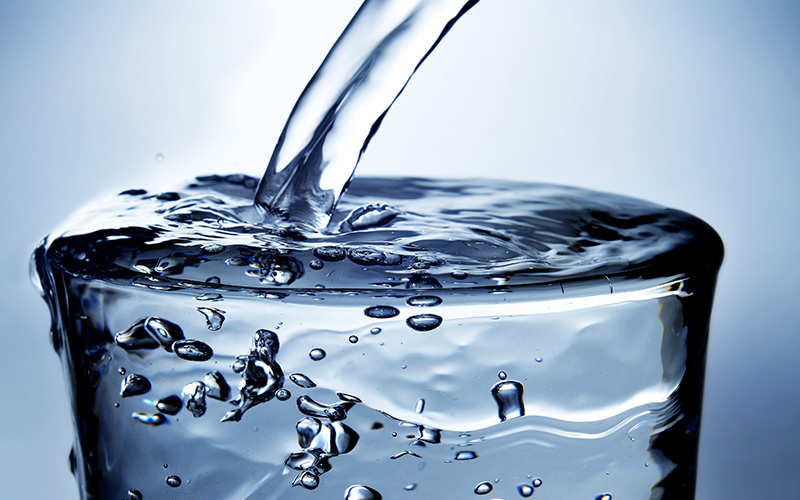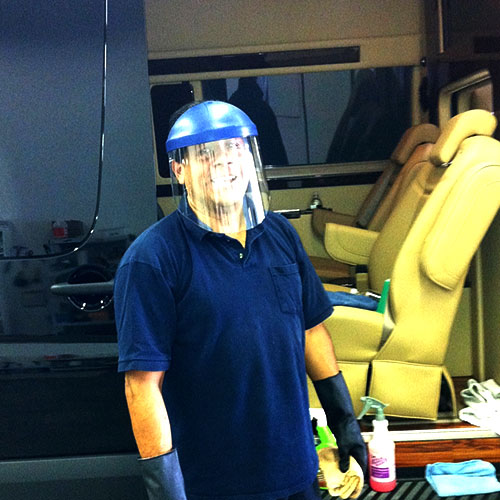
Although Brilliant is a transportation company, we care about preserving the environment. We take the fact that we share it with you very seriously. And we do our part to mitigate damage to the environment.
Obviously the transportation industry is known for its intensive use of fossil fuels. There is justified concern about the impacts petroleum based products have on the living ecosystem. There is also the growing realization that precious resources should be conserved as well.
One way we addressed our desire to minimize our impact on the environment is our switch to biodiesel fuel to power our fleet. Another major initiative we have taken is to reduce our water usage in operating our fleet of luxury vans and buses.
When you wash your own car, you know it doesn’t take much time for dozens of gallons of water to be washed down the drain. For commercial fleet operators, the challenge is even greater. Without careful supervision, thousand of gallons of fresh water can easily go to waste.
In Los Angeles, drought is a major concern, and water restrictions are always a possibility. Many communities in California have already moved to voluntary water restrictions to cut usage. In some harder hit areas, there is already mandatory water reductions in place.
Early reports say that 2013 could be the driest, or at least second-driest year in California’s history! Recently the Los Angeles Department of Water and Power asked all its customers to end non-essential and unauthorized water usage.
These non-permitted uses include:
- Hose washing cars without a self-closing shut-off device
- Use of water through leaky pipes
- Allowing runoff onto streets and gutters from excessive watering
- Use of water to wash hard surfaces like sidewalks or driveways unless a health hazard is present.
- Consecutive daytime landscape watering
- Installing non-recirculating systems in new car washes and commercial laundry systems.
Further restrictions, such as a mandatory 20% customer reduction in usage could soon become law. In addition to regulations concerning water usage, local authorities are also concerned about polluted water ending up in the regional watershed; eventually ending up in our ocean and beaches.
Car washing, both private and commercial, is a major factor in introducing pollutants, such as gasoline, oil, engine degreasers, exhaust residues, soaps and harsh chemical detergents used in many cleaning products, into the watershed; affecting land and sea animals alike.
The City of Los Angeles has a Stormwater and Urban Runoff Pollution Control Ordinance, which regulates all stormwater-polluting activities. For businesses, uncontrolled release of gray water into streets or storm channels is prohibited.
At Brilliant’s Los Angeles facility, vehicle washing is not even allowed because our facility did not come equipped with the proper drainage infrastructure. The California State Water Resources Control Board also regulates any activity that might affect the quality of state waters, mandating local communities come up with plans for mitigating runoff.
On a community level, one of the big problems of people washing their vehicles in their driveways is that the runoff goes straight into the storm drains and out to sea, untreated and unchecked. Car washes are already required to channel their runoff into the sewer system so those waters can undergo treatment at the waste water plants before being discharged back into the oceans. Still, many people don’t see the connection between Sunday morning car-washing rituals and environmental degradation.
According to one report, washing a car at home typically uses between 80 and 140 gallons of water. Surprisingly, commercial car washes typically use less than home car washes. They average about 45 gallons per wash due to computer controlled systems and high-pressure nozzles and pumps that minimize water usage. Many also recycle and re-use the rinse water. Still, compared to ‘waterless’ washing methods that may only use a couple gallons at most per wash, this is a very high, and some say a wasteful use of fresh water.
 That’s why, since the beginning, we’ve always used a ‘waterless’ cleaning method to detail our vehicles. Every week, we have many vehicles to clean, and we completely detail every vehicle, inside and out, after every use. Instead of using hoses to wash down our vehicles, we use spray bottles and microfiber towels to hand-clean every segment of the vehicle until it’s spotless.
That’s why, since the beginning, we’ve always used a ‘waterless’ cleaning method to detail our vehicles. Every week, we have many vehicles to clean, and we completely detail every vehicle, inside and out, after every use. Instead of using hoses to wash down our vehicles, we use spray bottles and microfiber towels to hand-clean every segment of the vehicle until it’s spotless.
We use a variety of gentle, biodegradable cleaning solutions as well as spray-on waxes to clean and polish every surface on the vehicle, removing dirt and grime in the process. Occasionally small amounts of water are needed to clean heavily covered surfaces. In these situations, the water is applied by hand using a spray bottle, not a water hose.
It takes more time to clean a vehicle this way, but the savings to our resources are definitely worth it. For those not in the industry, ‘waterless’ car washing does not mean water-free, but instead refers to drastically reduced or minimal use of water. In some cases, there is no substitute for water when it comes to completing a cleaning task.
While we voluntarily clean our vehicles this way out of good conscience, there could come a time in the not so distant future when all commercial operators will be forced by law to adopt our standards. Many factors are conspiring to tighten regulations around commercial cleaning operations, including increasing pollution and water shortages. But at Brilliant Transportation, we are ahead of the curve!
